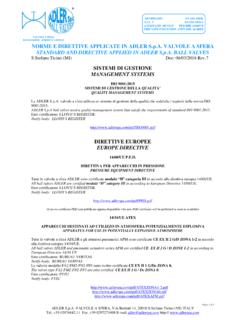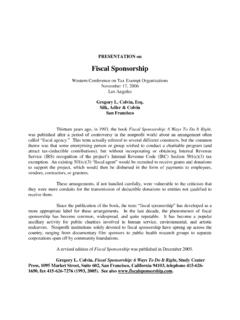Transcription of The Individual Psychology of Alfred Adler
1 Karen John, Belonging & Significance, ASIIP Conference, Bath 29-30 April 2011 Page 1. The Individual Psychology of Alfred Adler I. In this theoretical framework, behaviour is viewed as: A. Purposeful, goal directed, self-determined. We humans set our own goals and determine our own movements through life, although rarely are we fully conscious of our goals or why we behave the way we do. The questions are: What is the use of our behaviour? What purpose do our actions or inactivity . serve? B. Motivated by a desire to belong. We humans are socially embedded.
2 We are motivated to find our place in our families, at school, at work and in society. If we feel inadequate or inferior to others, then we doubt our place in the group. Instead of moving towards participation and co-operation, we defend ourselves against those demands. C. Holistic. Each Individual is viewed as more than the sum of her/his physical, mental and emotional faculties: mind and body are interdependent, as are what is conscious and unconscious. Behaviour is best understood as part of a unity of pattern, which leads to an emphasis on each Individual 's unique lifestyle, a term that conveys more dynamism and movement than the term 'personality'.
3 II. An Individual 's life style: A. Shaped by experiences in the first few years of life. Birth order, family circumstances and siblings all contribute, but our own Individual ways of making sense of what we experience is even more important. In the Adlerian framework, what we remember is more important than what we forget, since our memories (however accurate) are the bases of our beliefs about ourselves, others and life in general and what we must do in order to find a place or even survive. B. Informs choices and actions. Everything we do has the goal of making us feel better or safe, but our notion of the way the world works and what we must do, our 'private logic', is often faulty and leads to our becoming stuck and unhappy.
4 That's because private logic is based on the conclusions we came to when we were 3, 4, 5. or 6 year olds. Adler observed that common to all humans is a striving to overcome feelings of inferiority, which come about through our astounding powers of observation, which make us aware of our vulnerability and dependency. This leads to a striving for superiority - or in Adler 's terms, from a felt minus to a felt plus. At the same time our Individual ways of overcoming our feelings of inferiority will vary in many ways, including our innate talents or handicaps, what was going on around us, whether we were encouraged to co-operate or compete with others, whether we were able to find the 'courage to be imperfect'.
5 1. Karen John, Belonging & Significance, ASIIP Conference, Bath 29-30 April 2011 Page 2. III. The Practice of Individual Psychology Adlerian counsellors and therapists work with the relationship the Individual has with the challenges of living with the Individual 's own body, his or her bodily functions, the functions of his or her mind, as well as with external factors. The relationship the Individual has with the outside world is always guided by Individual self-perceptions and perceptions of external challenges or problems. We assume a collaborative and encouraging stance, ever alert to our clients' strengths and working with them to see how they might use those strengths to achieve what they want in their lives.
6 Neither heredity nor environment nor shared human limitations determine the Individual 's relationship to the outside world. Heredity endows certain abilities;. environment confers relative advantages or disadvantages and impressions; being alive and human makes us vulnerable, mortal and fallible. However, the Individual 's interpretations of his or her experiences are the substance from which he or she actively and uniquely creates attitudes towards self, others, the world and life itself. Each generation meets different problems, but each Individual sees all of his or her problems from a perspective of his or her own creation.
7 Through the Individual 's unique biased apperceptions life's challenges are seen as soluble or insoluble. Adler 's is often referred to as a Psychology of use not of possession. In other words, it is what we make of what we have and what we experience rather than what we are born with or experience that determines what we do and how we feel. There are shared tasks from which no Individual can escape, and there are a number of problems to solve, in the areas of 1) work or occupation, 2) relationships with others, 3) love, sex and intimacy, 4) relationship with self and 5) spirituality or the cosmos.
8 The way the Individual behaves towards these tasks helps us to understand his or her perceptions of, and solution to, the challenges presented by these tasks. Life moves us towards becoming' or overcoming', towards perfection' towards superiority', towards success'. Life is about survival and belonging. It is not possible to train or condition a living being for defeat. But the meaning of success for each Individual is unique and constitutes a goal that is acceptable to him or her. In reality no single Individual can be typified or classified.
9 In order to understand an Individual and to help him or her understand him or herself requires a thorough investigation of his or her unique facets. However, classification helps to hone in on the Individual 's unique way of moving through life, and Adlerians often use one or more broad descriptive systems. Adler 's approaches to reality' typology Adler himself specified four general approaches to reality, one of which can be observed in an Individual 's every interaction and relationship, from early childhood through the end of life. These are: 2.
10 Karen John, Belonging & Significance, ASIIP Conference, Bath 29-30 April 2011 Page 3. 1) a dominant, or the ruling (or elevating) attitude, 2) an attitude of leaning on and expecting everything from others, or the getting attitude, 3) an attitude whereby success is perceived to come by avoiding the solution to a problem, which in reality involves side-stepping in an effort to avoid defeat, or the avoiding attitude, and 4) an adaptive attitude of grappling to find solutions to life's problems in a way that is useful to oneself and to others. An Individual typically retains his or her basic approach, unless he or she becomes convinced of the mistake in his or her creation of his or her attitude toward reality.






